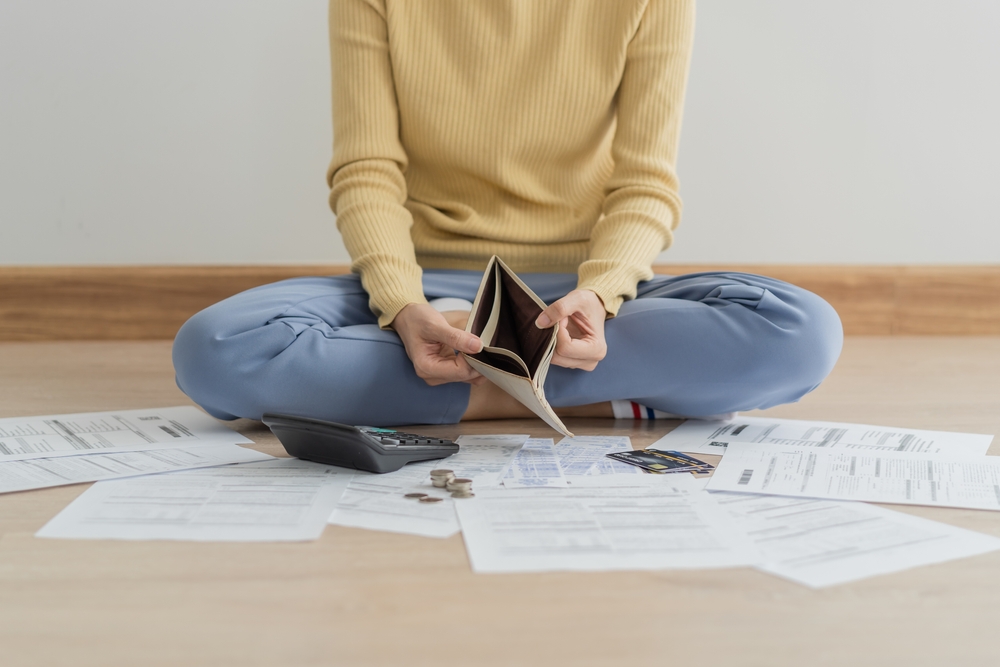Money is one of the most important aspects of life, but many people have a complicated or unhealthy relationship with it. Whether it’s fear, guilt, or stress surrounding financial matters, your relationship with money can impact everything from your daily decisions to your long-term financial health. If you notice certain behaviors or patterns in your approach to money, it’s important to address them to start having a healthier, more abundant relationship. Here are 15 signs you might have a weird relationship with money and how to change it to have more.
1. You Avoid Making Financial Decisions

If you find yourself avoiding financial decisions—whether it’s investing, saving, or even paying bills—it’s a clear sign of financial avoidance. This can stem from fear of making the wrong choice or feeling overwhelmed by the complexities of money management. When you ignore these decisions, the situation only worsens over time, leading to financial uncertainty. The key to overcoming this is to start small by setting a monthly budget, choosing a simple savings plan, or seeking professional financial advice to help make informed decisions.
Taking action, even in small steps, can give you a sense of control. Begin by tackling the easiest financial decisions first, and gradually build confidence in your ability to make bigger decisions. By facing your financial responsibilities instead of avoiding them, you’ll begin to feel more empowered and in control of your money. According to Phys.org, financial avoidance often stems from feelings of helplessness and a lack of control over one’s finances, which can lead to procrastination and worsening financial situations.
2. You Feel Anxious Every Time You Check Your Bank Account

If checking your bank balance causes anxiety or stress, it’s a sign that your relationship with money may be out of balance. You might be living paycheck to paycheck, or perhaps you’ve avoided looking at your finances for so long that it feels overwhelming. This fear of your financial reality can perpetuate a cycle of financial stress. To change this, start by facing your finances head-on—create a budget, track your spending, and set small, achievable financial goals to take control.
Facing your finances doesn’t mean you have to make drastic changes immediately, but it’s about taking that first step to regain control. Regularly checking your account and understanding where your money goes can make you feel more empowered and less anxious. As you build confidence in managing your finances, your anxiety will decrease, and your relationship with money will shift toward a healthier, more positive one. According to Mental Health and Money Advice, financial anxiety often stems from avoidance behaviors and fear of facing financial realities.
3. You’re Afraid To Talk About Money

If the mere thought of discussing money with others makes you uncomfortable, it’s a sign that you may have a strained relationship with it. Conversations about salaries, savings, or investments often feel like taboo topics, but avoiding them can leave you in the dark about your financial health. You might be afraid of being judged or criticized for not having enough or not managing your money well. To change this, start opening up to trusted friends or family members about finances, or seek advice from a financial expert to gain clarity.
Talking about money doesn’t have to be uncomfortable. It’s an essential part of financial growth, and once you start having these conversations, you may realize that you’re not alone in your struggles. By discussing money more openly, you’ll not only gain valuable insights but also reduce the shame and fear surrounding financial topics. According to Bankrate, 52% of Americans report that money negatively impacts their mental health, highlighting the importance of addressing financial concerns openly.
4. You’re Constantly Living Paycheck To Paycheck

If you’re living paycheck to paycheck and feel like there’s never enough money, it’s a sign that you may need to reassess your spending habits and financial goals. This cycle can feel exhausting and discouraging, especially if you don’t have any savings or an emergency fund to fall back on. It’s important to start building a budget that prioritizes savings, even if it’s just a small amount at first. Having an emergency fund will reduce the stress of living paycheck to paycheck and create a sense of financial security.
To break free from the paycheck-to-paycheck cycle, begin by tracking your expenses and identifying areas where you can cut back. Automating your savings can help ensure that you’re consistently putting money aside, even if it’s a modest amount. Over time, as you develop better money habits and increase your savings, you’ll feel more secure and less dependent on each paycheck. According to Investopedia, living paycheck to paycheck often requires reassessing spending habits, building a budget, and prioritizing savings to achieve financial stability.
5. You Feel Guilty When You Spend Money

Feeling guilty or ashamed when you make a purchase, even if it’s necessary or a treat for yourself, indicates a distorted relationship with money. This guilt often comes from deep-rooted beliefs about money, such as thinking it’s bad to spend or feeling that you don’t deserve financial freedom. To break this cycle, it’s important to develop a healthy mindset about money, where spending is a part of life and should be done thoughtfully and responsibly.
Start by practicing mindful spending—before making any purchase, ask yourself if it aligns with your values or long-term goals. Create a budget that includes both essential spending and guilt-free indulgences so that you can enjoy your money without feeling bad. Over time, this will help you build a healthier perspective on spending, freeing you from unnecessary guilt.
6. You Have No Financial Goals

If you don’t have any clear financial goals or plans, you may find yourself drifting financially. Without goals, it’s easy to waste money or find yourself stuck in financial limbo, unsure of where you want to be in the future. To change this, it’s essential to set both short-term and long-term financial goals—whether it’s paying off debt, building a savings account, or investing for retirement. Having specific goals will give you a clear direction and help you make decisions that support your financial well-being.
Start by breaking down your long-term goals into smaller, more achievable steps. Whether it’s saving for a vacation or building an emergency fund, having a plan will give you purpose and motivation. Tracking your progress and celebrating small milestones will keep you on track and make it easier to achieve your larger financial goals.
7. You Avoid Looking At Your Credit Score

If you’re avoiding checking your credit score, it’s a sign that you may be afraid of facing financial realities. Your credit score affects many areas of your financial life, from loan approvals to interest rates, so it’s important to know where you stand. Avoiding it doesn’t make it go away; in fact, it can cause unnecessary stress and prevent you from taking action to improve it. Start by checking your credit score regularly and reviewing your credit report for any discrepancies or areas to improve.
Once you know where you stand, take proactive steps to improve your score, such as paying bills on time, reducing outstanding debt, and avoiding new credit inquiries. Understanding your credit score will help you make better financial decisions and avoid future problems. Taking control of your credit is an important step in building a healthier relationship with money.
8. You Make Emotional Purchases

Emotional spending is when you buy things to cope with feelings of stress, anxiety, or boredom. While occasional indulgence isn’t a problem, regular emotional purchases can lead to financial trouble and unnecessary debt. To address emotional spending, it’s important to identify the triggers that cause you to shop for comfort. Instead of turning to shopping when you’re feeling down, find healthier ways to cope, such as exercising, journaling, or speaking to a friend.
Recognizing the emotional triggers behind your spending is the first step in changing this behavior. Create a strategy to deal with your emotions that doesn’t involve buying things. By developing new coping mechanisms and being mindful of your spending habits, you can break the cycle of emotional purchases and start spending more intentionally.
9. You Believe Money Is The Key To Happiness

Believing that money alone will bring happiness can lead to unhealthy financial habits. While money can provide comfort and opportunities, it’s not the ultimate source of fulfillment. If you’re constantly chasing more wealth, you may neglect other important areas of life, such as relationships, health, and personal growth. To change this belief, focus on building a well-rounded life that includes financial security along with personal satisfaction and joy.
Start by identifying what truly brings you happiness and satisfaction, beyond material possessions. Shift your focus from accumulating wealth to creating meaningful experiences, building relationships, and taking care of your well-being. When you start viewing money as a tool for enhancing your life rather than the source of happiness, you’ll have a healthier relationship with it.
10. You Hide Your Financial Problems

If you hide your financial problems from others, you might be ashamed or embarrassed about your financial situation. This secrecy can perpetuate stress and prevent you from seeking the help you need. A healthier approach is to be open about your challenges and seek support when necessary. Talking to a financial advisor, a trusted friend, or even a therapist can help you gain perspective and find solutions.
By addressing financial difficulties openly, you can start to feel empowered instead of overwhelmed. Acknowledging your problems is the first step toward making positive changes. Seeking help will allow you to gain the knowledge and tools necessary to regain control of your finances.
11. You Spend Money To Keep Up With Others

If you often find yourself spending money to impress others or keep up with social expectations, it’s a sign that your relationship with money may be influenced by external pressures. This kind of behavior often leads to debt and financial insecurity, as you’re prioritizing appearance over long-term stability. To change this, focus on what truly matters to you and your financial goals, rather than comparing yourself to others.
Start by redefining your financial success based on your values, not societal standards. Create a budget that allows you to live within your means while still enjoying the things you value most. By stopping the cycle of comparison, you can focus on financial independence and personal satisfaction.
12. You Only Think About Money When You Need It

If you only think about money when you’re in a crisis or need it for something urgent, it’s a sign that your relationship with money is reactive rather than proactive. Regularly thinking about and planning for your finances, even when you’re not in a financial bind, will help you avoid emergencies in the first place. By becoming more intentional about your financial decisions, you’ll avoid making hasty choices under pressure.
Start by creating a financial plan that includes budgeting, saving, and investing, so you’re prepared when the unexpected happens. This proactive approach will help you stay in control of your finances and reduce stress when money issues arise. Regular financial planning is key to creating long-term wealth and stability.
13. You Feel Overwhelmed By Financial Decisions

If making financial decisions feels overwhelming or confusing, it may indicate that you lack confidence in your money management skills. This can lead to procrastination or poor decision-making. The best way to change this is to educate yourself about personal finance. Whether through books, podcasts, or speaking with a financial expert, increasing your financial knowledge will help you feel more confident and less stressed.
Taking the time to learn the basics of budgeting, investing, and saving can make a big difference. Start small by setting up a simple budget or learning about one aspect of personal finance at a time. Over time, you’ll develop a stronger understanding of money management, making financial decisions feel less daunting.
14. You Don’t Trust Yourself With Money

If you lack trust in your ability to manage money, you might feel paralyzed by financial decisions or avoid dealing with money altogether. This lack of self-trust can stem from past mistakes or a lack of financial education. To build trust in yourself, start by setting small, achievable financial goals that you can stick to. As you accomplish these goals, your confidence in managing your finances will grow.
Remember that no one is perfect, and everyone makes financial mistakes. The key is learning from them and taking proactive steps to improve your money habits. By starting with small wins, you’ll build a solid foundation of trust in your financial abilities.
15. You Are Stuck In Debt

If you’re stuck in debt and feel like you’ll never get out, it can be easy to lose hope and continue accumulating debt. However, staying in debt only perpetuates financial stress and limits your financial freedom. To change this, start by creating a debt repayment plan that prioritizes high-interest debts and makes use of strategies like the snowball or avalanche methods.
Track your progress and celebrate small victories along the way, such as paying off a single debt or reducing your overall debt. With patience, discipline, and a clear plan, you can work your way out of debt and toward financial freedom. This will dramatically improve your relationship with money and give you the confidence to take control of your finances.
This article is for informational purposes only and should not be construed as financial advice. Consult a financial professional before making investment or other financial decisions. The author and publisher make no warranties of any kind.








